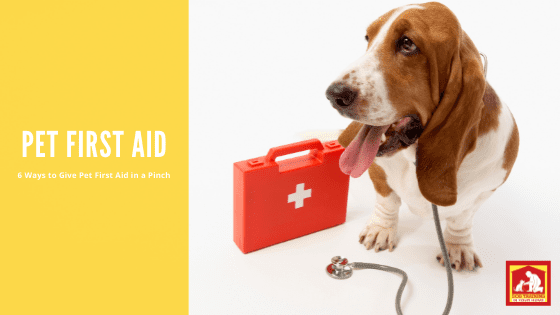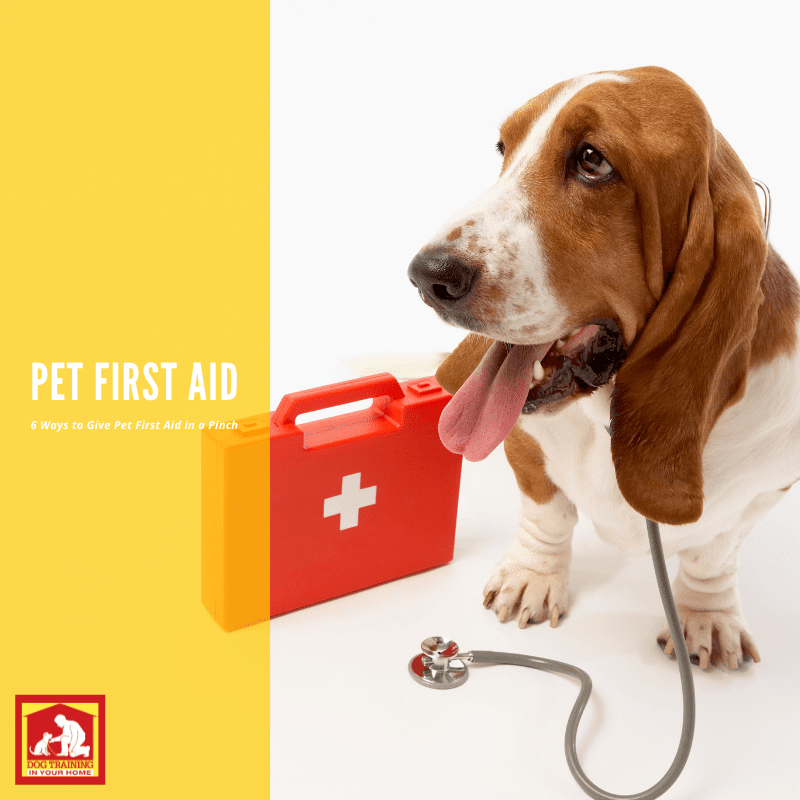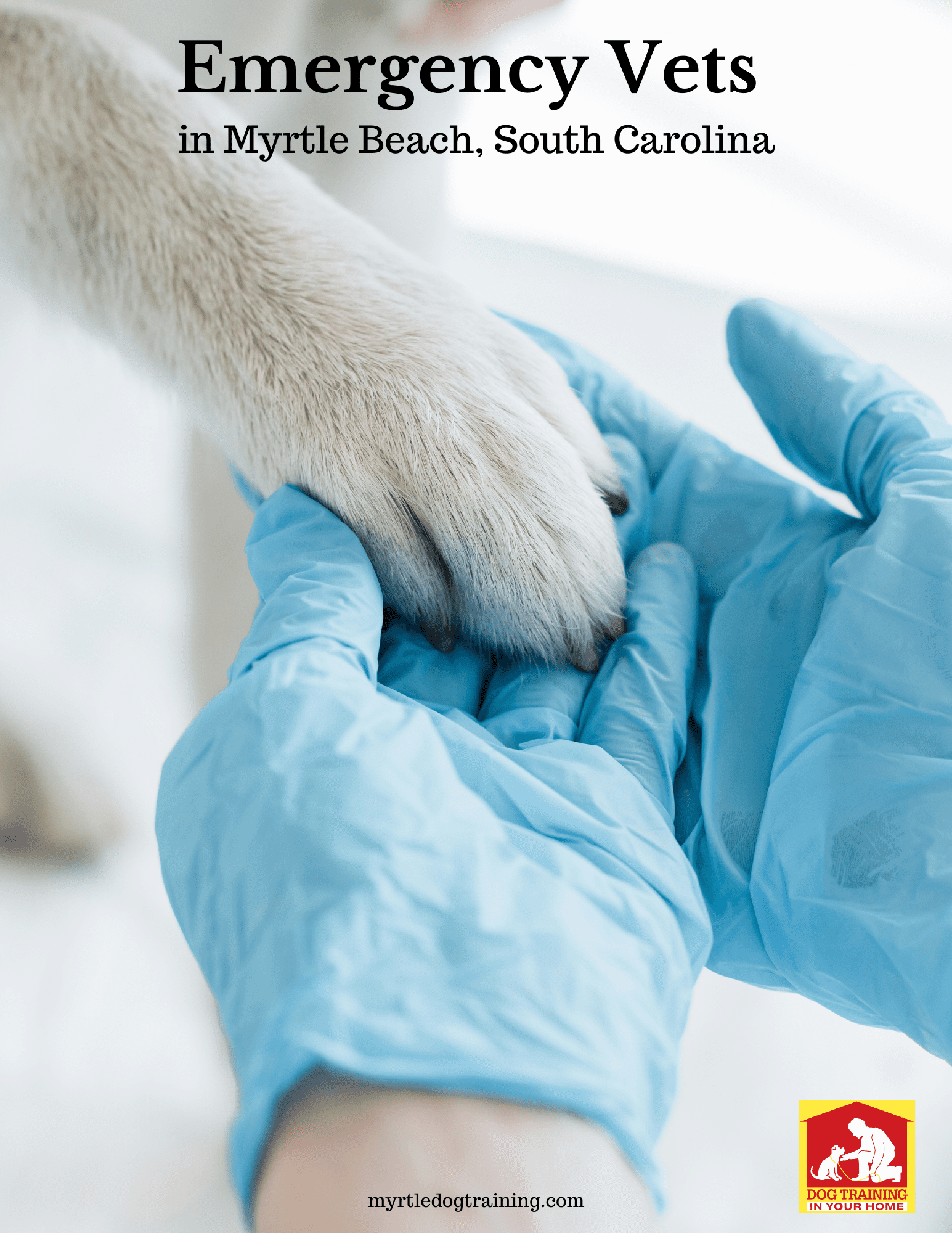
Pet First Aid – Getting Creative in A Pinch
To be honest, I hope you never need this article. No one likes to think about their pet being hurt. But, the reality is: IT CAN HAPPEN. I wouldn’t be a responsible dog trainer if I didn’t think about “worst case scenarios” for my clients and how to be prepared/prevent them. While not everyone has time to take a Pet First Aid Class, there are some things you can do at home if your pet becomes injured to help you get them to the vet quickly and safely.
If you have a chance, I highly recommend taking a Pet First Aid Class!
Most of my trainers are certified through the American Red Cross for Pet First Aid. Unfortunately, the Red Cross discontinued their Pet First Aid Certification course around 2016. A quick Google Search for other options in the Columbia area yielded Pet Tech where you can search for classes near you. The only other option was an online course: E-training for Dogs.
Like I said, if you don’t have time for the First Aid Class itself, here are some other options in a pinch:
Prepare ahead of time and before you start rendering first aid
There’s an App for That! (Of Course There Is)
While not the only one, The American Red Cross offers a Pet First Aid App. You can conveniently toggle between cat and dog content, have step-by-step instructions, and even program a veterinary contact number in so you can access it throughout the app at any time. There is also a locator to find the nearest emergency vet hospital or pet-friendly hotels (helpful when traveling!).
TIP: always alert a vet clinic while you are on route with an emergency with an ETA so they can try and prepare an exam room. Mine was $1.07 with tax on Android, but I think personally that’s a fair price if it could save my dog’s life ;-P
Safely Restrain An Injured Dog
EVERY DOG BITES. Even if you have the *sweetest* dog on the planet, if it is hurting, it has the potential to bite. So you need to restrain it in order to PROTECT YOURSELF. Seriously – you can’t help your dog if you are hurt, too!). A CARDINAL RULE OF PET FIRST AID: “Protect yourself first before rendering care”.
For example, a six-foot nylon leash can be fashioned into a muzzle to prevent your injured dog from being able to open it’s mouth wide enough to bite you. Meanwhile, it will still allow him to breathe (yet another benefit to having your dog on a nylon leash instead of a retractable one!!).
How to create a muzzle out of a 6 foot leash:
- Form a noose and make the first tie on the bridge of your dog’s nose.
- Tie under the chin
- Tie on the back of the neck below the ears
- Finish by threading one end under the first tie on the bridge of the nose looped back to the top of the head – tie in a bow (NEVER a knot)
Other Options instead of a leash:
- A drawstring from a hooded sweatshirt or sneaker shoelace (smaller dogs)
- Belts can work in some circumstances
- For short-muzzled dogs: roll a thick bath towel around their necks, grip the ends behind their heads, lifting it slightly up to prevent them from opening their mouths wide enough to bite
Common injuries and ways to help without a first aid kit:
Physical Maladies
Cut Paws
If you have a larger dog too heavy to carry a long distance (so they will have to walk):
- Clean the paw with bottled water (or any clean water source – just not a lake, river, etc.).
- Use some sort of cloth to apply pressure and stop bleeding.
- Leave the folded cloth on the wound.
- Wrap the paw in a crew sock (or unused plastic doggie bag).
- Tie snugly with a hair tie or shoelace.
Strains and Sprains
Limit movement to prevent putting any weight on the injured limb.
- Apply your restraint muzzle
- Create a makeshift splint with paint stirrers, Popsicle sticks or something with stability
- Place stabilizers on injured area
- Wrap the limb with a water bottle, newspapers, or magazine held in place with shoelaces or a bandanna.
- Dogs too heavy to lift can be placed on a sweatshirt, towel, etc. and dragged or carried in a “sweatshirt sling”
Insect Stings
Reduce the chance of your dog being stung by keeping clear of ground cover on your leashed walk, and make sure he knows his recall command, or a “leave it” command so he doesn’t get too curious. If he does get stung:
- If you see the stinger, slide the edge of your credit card or driver’s license against the stinger to usher it out.
- DON’T USE TWEEZERS OR YOUR FINGERS! You can rupture the poison sac and make things worse.
- Keep yourself and your dog calm.
- If he shows signs of breathing difficulties or the area swells, take him to the nearest vet clinic.
- If you need to administer an antihistamine, make sure the only ingredient is diphenhydramine.
Protect Their Core
To Keep Your Dog Cool
Remember, dog’s perspire through their paws:
- Dip their paws in cool water.
- Pour bottled water onto your baseball cap or bandanna.
- Place cool water/ice on their bellies or between their back legs.
To Keep Your Dog Warm
- Coat their paws with petroleum jelly to keep ice crystals or salt from cutting their paws.
- “Hug, not rub” your dog to warm him if he is suffering from frostbite.
- Small dogs: place inside a winter coat to gradually warm them up with your body heat.
- Large dogs: wrap in a Mylar blanket.
Inspired by Dogster Magazine
Related: Are You Up To Date on Your Poison Prevention?
Need a List of Emergency Vets? Sign Up Below:
If you want a PDF list of options on where take care of your dog in an emergency/after hours, sign up below and we'll send you one 🙂
Call today: 843-360-6033 FIRST VISIT FREE!
Any age, Any breed; Veterinarian Recommended








